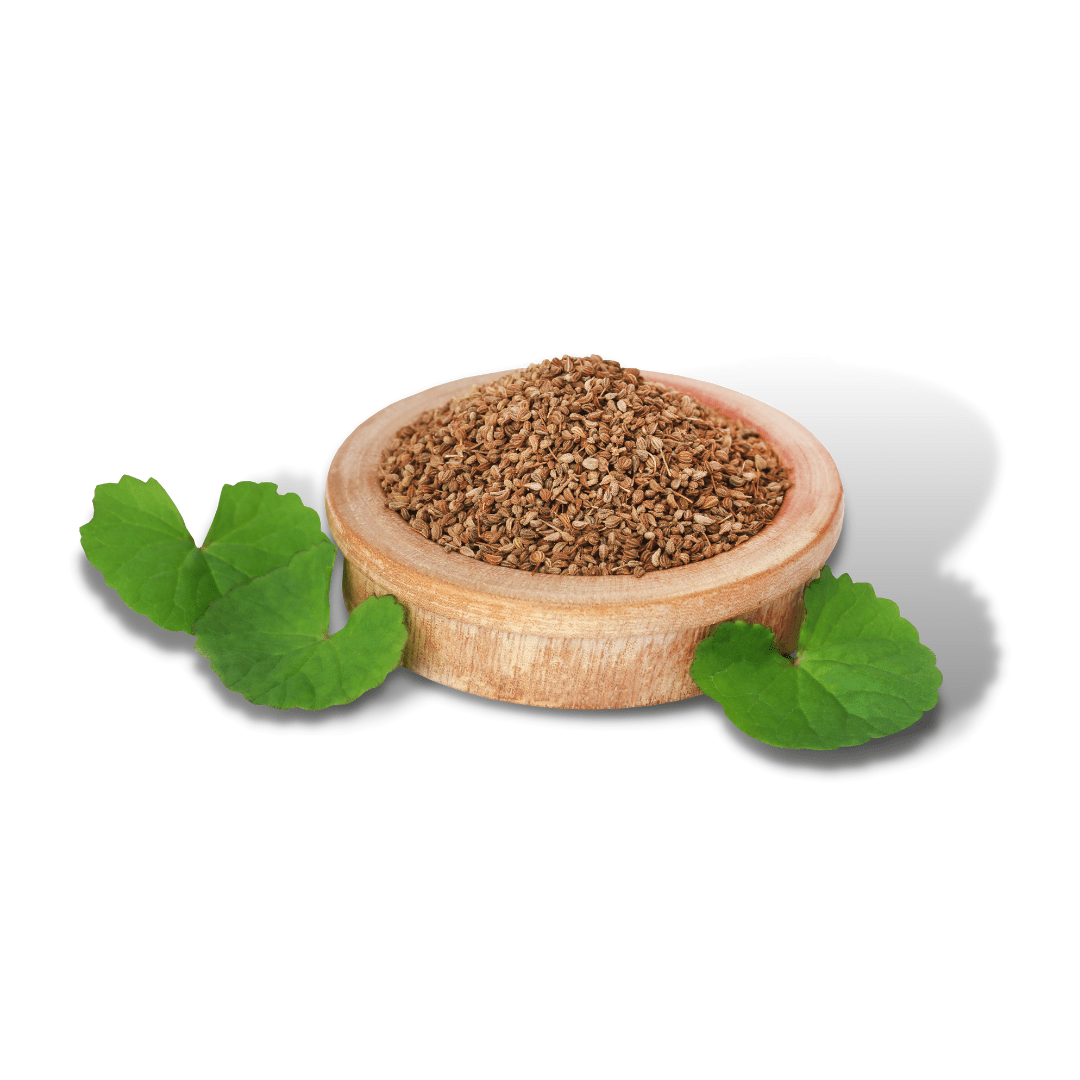Ajwain seeds are small and oval-shaped with a brown color, and they have a strong, pungent, and slightly bitter taste. They are commonly used in spice blends and are added to dishes such as curries, bread, and lentil dishes.
Besides its culinary uses, ajwain has been used for its medicinal properties in Ayurvedic and traditional medicine. It is believed to aid digestion, relieve flatulence and constipation, and provide relief from cough and cold symptoms.
Ajwain oil, extracted from the seeds, is used in aromatherapy and massage therapy for its calming and relaxing properties.
Ajwain should be used in moderation as it has a strong flavor and can overpower other flavors in a dish. It should also be avoided by pregnant women as it is believed to have uterine stimulant properties.
10 Benefits of Ajwain / Carom Seeds
-
Aid Digestion: Ajwain seeds contain enzymes that can help improve digestion and relieve indigestion, bloating, and flatulence.
-
Relieve Constipation: Ajwain seeds have a laxative effect and can help relieve constipation and promote bowel movements.
-
Improve Respiratory Health: Ajwain seeds have anti-inflammatory properties that can help relieve cough, cold, asthma, and other respiratory conditions.
-
Reduce Inflammation: Ajwain seeds contain thymol, a natural compound that has anti-inflammatory properties and can help reduce inflammation and pain in the body.
-
Boost Immunity: Ajwain seeds are a good source of antioxidants and can help boost immunity by fighting against free radicals that cause cell damage.
-
Regulate Blood Pressure: Ajwain seeds contain minerals such as calcium, potassium, and magnesium that can help regulate blood pressure and prevent hypertension.
-
Improve Skin Health: Ajwain seeds contain vitamins and minerals that can help improve skin health and prevent acne, eczema, and other skin conditions.
-
Relieve Menstrual Cramps: Ajwain seeds have analgesic properties that can help relieve menstrual cramps and other menstrual-related issues.
-
Aid Weight Loss: Ajwain seeds can help boost metabolism and aid weight loss by reducing appetite and promoting fat burn.
-
Improve Oral Health: Ajwain seeds have antibacterial properties that can help improve oral health and prevent bad breath, gum disease, and tooth decay.
While ajwain/carom seeds have potential health benefits, it is important to consult a healthcare professional before using them for medicinal purposes.
When buying Ajwain seeds, it is important to choose high-quality seeds that are fresh, aromatic, and free of any impurities or adulterants. The seeds should be stored in an airtight container away from moisture and heat to preserve their flavor and nutritional value.
-
Thymol: A natural compound with antiseptic, antifungal, and antibacterial properties. Thymol is responsible for the strong flavor and aroma of ajwain seeds.
-
Carvacrol: Another natural compound with antimicrobial and antioxidant properties. Carvacrol is also responsible for the flavor and aroma of ajwain seeds.
-
Terpinene: A natural compound that has anti-inflammatory and antiseptic properties.
-
Limonene: A natural compound with anti-inflammatory and antioxidant properties. Limonene is also found in citrus fruits and is responsible for their characteristic aroma.
-
Pinene: A natural compound with anti-inflammatory and antiseptic properties. Pinene is also found in pine trees and other coniferous plants.
-
Myrcene: A natural compound with anti-inflammatory and analgesic properties. Myrcene is also found in hops and other plants.
-
Cymene: A natural compound with anti-inflammatory and antiseptic properties.
These natural compounds give ajwain seeds their potential health benefits and are also responsible for their use in traditional medicine and aromatherapy.
Energy content in 50 grams of Ajwain: 200 kcal
Macronutrient content in 50 grams of Ajwain:
| Nutrient | Amount |
|---|---|
| Carbohydrate | 32.6 g |
| Fat | 20.8 g |
| Protein | 16.3 g |
| Fiber | 21.0 g |
| Water | 3.3 g |
Vitamin content in 50 grams of Ajwain:
| Vitamin | Amount |
|---|---|
| Vitamin A | 1.8 mcg |
| Vitamin B1 | 0.4 mg |
| Vitamin B2 | 0.4 mg |
| Vitamin B3 | 1.7 mg |
| Vitamin B6 | 0.3 mg |
| Vitamin B12 | 0 mcg |
| Vitamin C | 3.3 mg |
| Vitamin D | 0 mcg |
| Vitamin E | 2.3 mg |
| Vitamin K | 26.4 mcg |
| Folate | 22.4 mcg |
| Biotin | 0.6 mcg |
Mineral content in 50 grams of Ajwain:
| Mineral | Amount |
|---|---|
| Calcium | 499 mg |
| Iron | 34.5 mg |
| Iodine | 0 mcg |
| Zinc | 3.6 mg |
| Magnesium | 231 mg |
| Phosphorus | 489 mg |
| Potassium | 1363 mg |
| Sodium | 92 mg |
| Chloride | 0 mg |
| Copper | 0.5 mg |
| Chromium | 0 mcg |
| Fluoride | 0 mcg |
| Molybdenum | 0 mcg |
| Manganese | 1.8 mg |
| Selenium |
3.9 mcg |
- Hindi: Ajwain, ajowan, ajmoda
- Punjabi: Ajwain
- Urdu: Ajwain
- Bengali: Ajowan, yavanah
- Gujarati: Ajmo, Cavani
- Marathi: Onva, ova
- Tamil: Omam, alamo
- Telugu: Omam, vamp
- Kannada: Oma, om kalu
- Malayalam: Omam, ayamodakam
- Arabic: Kamme muluki, ajwan
- Persian: Zenyanah, ajwan
- Turkish: Çörekotu, kekik
- Greek: Thymbra, ajwain
What are Carom Seeds?
Carom seeds, also known as ajwain seeds, are the dried fruit pods of the Trachyspermum ammi plant. They have a strong aroma and a distinct, slightly bitter taste.
What are the health benefits of Carom Seeds?
Carom seeds have several health benefits, including aiding digestion, relieving flatulence and bloating, reducing stomachaches, and acting as a natural appetite stimulant.
How do you use Carom Seeds in cooking?
Carom seeds are commonly used as a seasoning in various dishes, especially in Indian cuisine. They can be dry-roasted, ground into a powder, or added whole to curries, bread, and snacks for their unique flavor.
Can Carom Seeds help with weight loss?
While Carom Seeds are not a direct weight loss solution, they can support weight management by improving digestion and reducing bloating, which may indirectly aid in weight loss efforts.
Are Carom Seeds safe for consumption?
Carom Seeds are generally safe for consumption in moderate amounts. However, it's advisable to consult with a healthcare professional, especially if you have any specific medical conditions or are pregnant or breastfeeding.
Do Carom Seeds have any side effects?
Carom Seeds are well-tolerated by most individuals. However, consuming excessive amounts may lead to temporary discomforts, such as heartburn or an upset stomach. It's recommended to use them in moderation.
Can Carom Seeds be used as a natural remedy for digestive issues?
Yes, Carom Seeds have been traditionally used as a natural remedy for various digestive issues like indigestion, gas, and acidity. They are believed to help alleviate these symptoms.
Are Carom Seeds suitable for individuals following a gluten-free diet?
Yes, Carom Seeds are gluten-free and can be safely consumed by individuals with gluten intolerance or those following a gluten-free diet.
How should Carom Seeds be stored?
Carom Seeds should be stored in an airtight container in a cool, dry place, away from direct sunlight. This helps to retain their flavor and aroma for a longer duration.
Can Carom Seeds be used as a natural remedy for cough and cold?
Carom Seeds have been traditionally used to relieve cough and cold symptoms. They are often combined with other ingredients, such as honey or ginger, to prepare home remedies for respiratory ailments.
Are there any studies supporting the health benefits of Carom Seeds?
While Carom Seeds have a long history of traditional use, scientific research on their specific health benefits is limited. However, anecdotal evidence and cultural practices support their effectiveness in certain areas.
Can Carom Seeds be used during pregnancy?
Pregnant women should exercise caution while consuming Carom Seeds. It is advisable to consult with a healthcare professional before incorporating them into the diet during pregnancy.
How long do Carom Seeds typically retain their potency?
When stored properly, Carom Seeds can retain their flavor and potency for up to one year. However, for the best taste and aroma, it's recommended to use them within six months of purchase.
Can Carom Seeds be used to alleviate menstrual cramps?
Carom Seeds have traditionally been used to provide relief from menstrual cramps. However, individual experiences may vary, and it's important to seek medical advice for severe menstrual discomfort.



